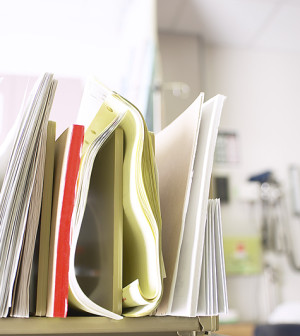- Double Mastectomy May Offer No Survival Benefit to Women With Breast Cancer
- Toxic Lead Found in Cinnamon Product, FDA Says
- Certain Abbott Blood Sugar Monitors May Give Incorrect Readings
- Athletes Can Expect High Ozone, Pollen Counts for Paris Olympics
- Fake Oxycontin Pills Widespread and Potentially Deadly: Report
- Shingles Vaccine Could Lower Dementia Risk
- Your Odds for Accidental Gun Death Rise Greatly in Certain States
- Kids From Poorer Families Less Likely to Survive Cancer
- Tough Workouts Won’t Trigger Cardiac Arrest in Folks With Long QT Syndrome
- At-Home Colon Cancer Test Can Save Lives
Primary Care Providers May Balk at Giving Teens Antidepressants


Primary health care providers are reluctant to prescribe antidepressants for their teenaged patients, even in cases of severe depression, a new study suggests.
The researchers found that those who were more knowledgeable about depression — and especially those who could consult with an on-site mental health expert — were more likely to prescribe antidepressants for depressed teens.
The study included 58 pediatric primary care providers. Most were doctors, but some were nurse practitioners or other professionals. The study participants were given hypothetical situations describing two 15-year-old girls with depression. One girl met the criteria for moderate depression and the other for severe depression, but neither was suicidal.
The participants were asked to make an initial treatment recommendation for each of the girls. Only one-quarter of them said they would prescribe antidepressants for the girl with moderate depression, and one-third said they would do so for the girl with severe depression, according to the study in the January issue of the Journal of Developmental & Behavioral Pediatrics.
According to current guidelines, teens with moderate to severe depression should be treated with antidepressants and/or a type of talk therapy called cognitive behavioral therapy, the researchers noted. They added that, in particular, antidepressants have been deemed effective for patients with severe depression.
Ninety percent of the practitioners said they would refer the girl with severe depression to a child or adolescent psychiatrist for medication management, and 60 percent said they would do so for the girl with moderate depression.
Consultation with a mental health expert is recommended for teens with severe depression, but not necessarily those with moderate depression, the study authors noted.
Practitioners who had access to an on-site mental health provider were about five times more likely to recommend antidepressants for the teen girls. In addition, those with more knowledge of depression were about 70 percent more likely to do so.
However, practitioners were less likely to say they would prescribe antidepressants if they felt a higher sense of personal burden when seeing patients with mental health problems, the report indicated.
The findings suggest that most pediatric primary care providers aren’t comfortable recommending antidepressants for depressed teens, said study author Dr. Ana Radovic, of Children’s Hospital of Pittsburgh, University of Pittsburgh Medical Center, and colleagues.
Teen depression “is a serious and undertreated public health problem” in the United States, the team noted in a journal news release.
“With the national shortage of child psychiatrists,” Radovic said in the news release, “education interventions which take into account a primary care provider’s feelings of burden when addressing mental health problems and collaborative care with mental health professionals will be needed to increase appropriate prescribing of antidepressant medications to depressed adolescents.”
More information
The American Psychiatric Association has more about teens and mental health.
Source: HealthDay
Copyright © 2024 HealthDay. All rights reserved.










